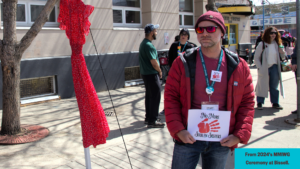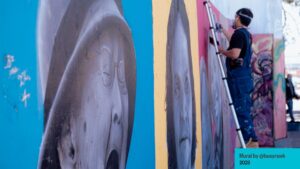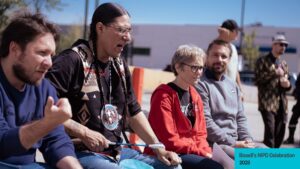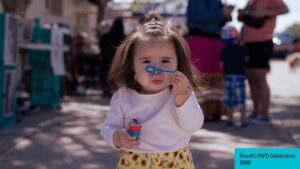The 2020s has been an important decade for Canada’s relationship with the Indigenous Nations. We’re seeing large institutions like Canada’s federal government acknowledge and recognize the atrocities committed against Indigenous Peoples.
One incredibly important stride forward was the publishing of the Final Report from the National Inquiry into Missing and Murdered Indigenous Women and Girls (MMIWG). This more than 700-page report highlights interviews with more than 2,300 people affected by violence against Indigenous People.
These stories illustrate the challenges faced by women and girls, and the continued violence against members of the 2SLGBTQIA+ community. By reading this document, we can gain better knowledge on the marginalization experienced by Indigenous Peoples — and ultimately, have the wisdom and perspective to know what we can each do individually to help create a more equitable world.

The Four Key Areas of Rights for Indigenous Peoples
In addition to the 231 recommendations the report makes to help end violence and marginalization against Indigenous Peoples, it highlights four key areas of rights for Indigenous Peoples and provides explanations as to how each help work towards this goal of ending violence:
- Right to Culture – this right specifically highlights previous generations trying to assimilate Indigenous Cultures and Nations and how these efforts created the foundation for the marginalization Indigenous Peoples continue to experience today.
- Right to Health – this highlights how all people within Canada have the right to access health care. For countless people rooted in Indigenous Nations, this is an area where they have experienced discrimination — this barrier to health care further adds to the violence experienced by Indigenous Peoples.
- Right to Security – countless stories shared through this national inquiry demonstrated the near constant threat Indigenous Peoples face while living day-to-day. And it’s not only physical security: emotional, mental, social, and cultural security are all key to ending this disproportionate violence.
- Right to Justice – experiences through Canada’s justice system can be incredibly inconsistent for Indigenous Peoples. These disconnections through Canada’s justice system can further perpetuate the violent experiences of Indigenous Peoples.
Why Education is Foundational to Ending Violence
While the 231 recommendations and the four key areas of rights largely focus on larger-scale systemic changes, that doesn’t mean everyday people are powerless to help steer this change along.
In fact, just being more aware of the kind of violence that Indigenous Peoples are facing is the perfect foundation needed to see the kind of change that will help end this violence.
Any meaningful action starts with awareness and education. With the knowledge and wisdom of the issues, their roots causes, and what needs to be done to address this inequity, the better you can direct your own actions to be more equitable to people rooted in Indigenous Nations.
And the more people there are who fully understand the issues and how to direct their own actions, the more forward momentum we can see to finally seeing an end to this disproportionate violence.
The fire crackles in front of 14 Elders and Knowledge Keepers sitting in a circle sharing, reflecting, and trying to imagine a more positive future for their communities. They were all invited to Moonlight Bay Centre for a retreat to commemorate National Day for Truth and Reconciliation — a day that can be especially difficult for these Leaders in their communities.
Many of them have either witnessed firsthand the atrocities of residential schools or have close family members who have shared their own stories (if they came home at all). And while the Elders and Knowledge Keepers reflected on the past and the challenges of the present, a new feeling emerged, seemingly from the embers and ashes dancing off the campfire.
They felt hope for the future.

Thoughtful Reflections Sitting by the Water
While this retreat included much of what someone might expect to find at an all-inclusive resort, the true aim for this event was to pay homage to the hard work of Elders and Knowledge Keepers acting as near-constant beacons of hope, helping their communities to safer waters. And while grief and reflection were ever-present, so was friendship, comradery, love, and optimism that they will continue navigating troubled waters.
“Many of the Elders and Knowledge Keepers who attended told me they had no idea we had a property so close to the water like this,” says Janet Paskemin, Manager of Indigenous Cultural Supports. Moonlight Bay Centre sits on Wabamun Lake with wonderful views of the water and surrounding woods.
“Just being by the water can do a lot for Elders and Knowledge Keepers,” says Janet. “It can help them clear their minds, reflect more thoughtfully, and think much clearer. For a lot of this retreat, the Elders and Knowledge Keepers sat by the lake, sometimes talking but more often just in silence with each other.”

Comradery, Friendships, and the Gifts of Food
While some of the Elders and Knowledge Keepers who attended were longtime friends, just as many had never met — despite this, the comradery was more than evident. These bonds formed sitting by the lake, solidified by the fire, but it was in the kitchen where one of the strongest gestures took shape.
Food Sovereignty is an act where visitors to Indigenous Nations would receive food as a token of gratitude and friendship. True to honouring the customs and traditions from Indigenous Nations, one Elder, who was previously a Chef, insisted on making home-made pancakes for everyone at the retreat.
“In truth, he wanted to give something to his friends, the same way we were giving so much to everyone during that retreat,” says Janet. “It’s hard to understate how important gestures of honour, friendship, and love are for the Elders and Knowledge Keepers.”

Hope for the Next Generations
Janet recalls one thing she heard time and time again throughout the retreat: that the Elders and Knowledge Keepers see the work that’s being done for Indigenous Peoples by so many young people. She expressed how the Elders and Knowledge Keepers are so incredibly hopeful for the next generations to continue improving the lives of others.
We were honoured to host the 14 Elders and Knowledge Keepers at Moonlight Bay Centre to acknowledge National Day for Truth and Reconciliation. We’re proud knowing that these important leaders in their communities had an opportunity to not only rest and reflect but to connect, share, express, and revitalize.

The role family plays in many Indigenous cultures can’t be understated. Blood familial ties and chosen families can hold the most sacredness and honour for Peoples in Indigenous Nations. The Community at Bissell Centre is no different.
Those strong family ties are especially prevalent at our National Indigenous Peoples’ Day (NIPD) event outside our Community Space (10530 96 Street) every June 21. This is a day of celebration where we block off part of the street, invite performers and artists to share their crafts, and serve some of the best Indigenous cuisine you can find in the city.

The Reverence held for Elders
Honouring Elders is one of the most important customs of NIPD. The knowledge and teachings these individuals hold in the communities not only preserves the traditional ceremonies and rituals that bring so much vibrancy and life to Indigenous Nations – they can also help guide individuals through challenges and onto the most life-affirming paths.
“One of the most important services we can offer with Bissell’s Indigenous Engagement Program is connecting individuals to Elders,” explains Sarah Higgins, Director of Indigenous Engagement and Integrated Family Services – and a Red River Métis woman. “The teachings and guidance Elders can provide and the connection they foster to Indigenous Nations can help a person decide it’s time to reach out for further supports in their unique journey out of poverty.”
At the NIPD event, you’ll see a tent specifically for Elders to sit in. They’re often accompanied by children from Indigenous Nations, as well, symbolizing how their knowledge will be passed down through generations to ensure the culture and traditions remain a vital part to one’s Indigenous identity.

The Crucial Chosen Families Built in the Community
For people accessing the services at Bissell Centre, families by blood aren’t always a part of their lives, yet the importance of family never really goes away for a lot of folks. Creating new chosen families then becomes a part of life in the community.
“It’s not uncommon to see folks in the community calling each other uncle, aunty, or cousin because this is the family they’ve built for themselves,” says Higgins. “Just like a family, these are support systems for each other and we see these connections as real family – just the same as any blood tie.”
Families and communities coming together to celebrate the resiliency of Indigenous Peoples shows how important NIPD is for the folks in downtown Edmonton. And no matter what that family looks like and who makes up that unique family unit, NIPD will have space for all who attend to celebrate the strength, culture, and customs from Indigenous Nations.









